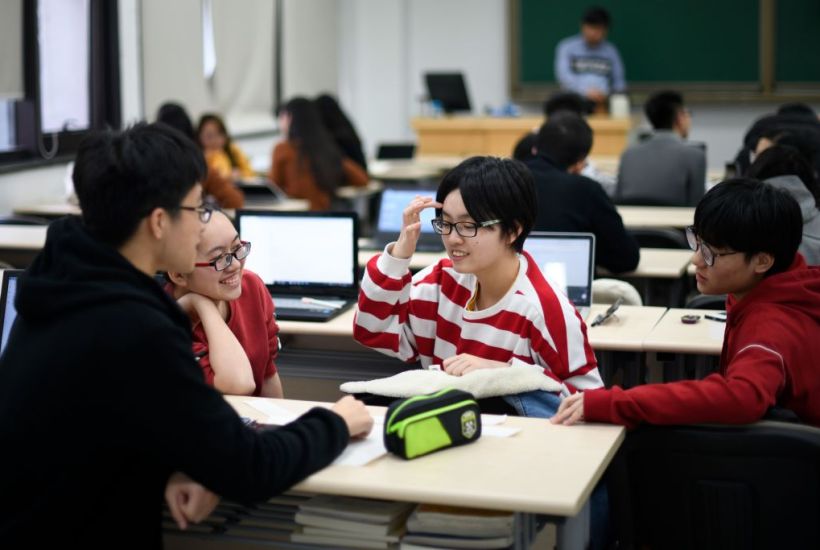Universities in the West can roll over too easily for the Chinese Communist Party. Jesus College, Cambridge, has been a case in point, as Charles Moore pointed out recently in the magazine. The University of Queensland in Brisbane last year appointed a sitting Chinese diplomat as a visiting professor; while MIT and the University of Sydney are among just a few of the universities partnering in research with Chinese tech companies that aid China’s surveillance state. It’s no surprise that this raises growing alarm about the influence of the CCP on our campuses. But it can be hard to separate the personal from the political – increasingly, the Chinese people are being thrown into the mix.
In much of the conversation surrounding our campuses, Chinese students have often been seen as sleeper agents ready to click into action at the flick of a switch in Beijing. Take a 2019 report from the Foreign Affairs Select Committee. ‘Despite the fact that there are now over 100,000 Chinese students in the UK, the issue of Chinese influence has been the subject of remarkably little debate compared to that in Australia, New Zealand and the US,’ it read. Just imagine all these teenagers sneaking into the country without proper scrutiny. ‘Puppets of China,’ one headline in the Times put it.
In other words, they’re not individuals with academic aspirations, not young people who want to see the world (just as the Brits who go to America, Australia, Europe, do), but that they are here to fulfil the political purpose of their government. The chair of the Foreign Affairs Select Committee, Tom Tugendhat, has been vocal against this grave threat, saying that ‘Those students will not just be bringing open minds ready to learn, but also the apparatus of state control, either through direct influence or through pressure exerted on their families that really is completely foreign to British universities.’
His latest intervention is to call for a ban on any students who ‘are used to empower state censorship’. How, precisely, would this state censorship take place? Critics point to a recent student motion at Warwick University, where an exceptional turnout overturned a motion in support of the Hong Kong protests. But defeating a student motion based on higher turnout surely is hardly censorship. If anything, it’s the opposite. Zishi Zhang, the (elected) international students officer at Warwick student union who was pivotal in organising the vote, said ‘I welcome this as a good sign that a group of people who are traditionally underrepresented have started to participate.’ And if claiming victory in student politics is considered a notch on the belt of Chinese agents, then the CCP may be easier to defeat than expected.
That’s not to say there aren’t more worrying examples. At Queensland, a student protest (over Hong Kong again) turned violent when pro- and anti-Beijing students clashed; in Canada’s McMaster University, Chinese students sought embassy help to boycott a critic of China’s treatment of its Uighurs. Any attempt to drown out opposing opinions should be called out and universities must defend diversity of opinion as usual. But evidence of a systematic and pervasive approach to co-opt Chinese students overseas has yet to be found. There are 700,000 of them globally: one or two incidents a year of student zealotry are certainly not enough to write off the entire group.
The instinct to conflate pro-Beijing students and the CCP is understandable – after all, these youngsters come to our campuses and often spout views shocking to the liberal imagination. But that doesn’t mean they’re on the payroll. Chinese students are also not a monolith (indeed, how can 700,000 people ever be?). Some of them like the CCP; others really don’t. Some of them are political and considered; others have gone with the flow. Some of them change their minds; and others don’t. One thing is for sure – they’ve chosen the West over China for their university years for a reason – to learn things that they wouldn’t in China.
In 2015, the Dalai Lama visited Oxford University. He was speaking to a group of around fifty Chinese students – some of them sceptical, but all of them attentive. There were no ugly scenes, no embassy presence. It’s received wisdom in the West that anyone who receives the Dalai Lama will be excommunicated by Beijing. I don’t know why Oxford escaped their wrath in that instance – but what I do know is that the Chinese students were there with open minds and treated His Holiness with the utmost respect. I know, because I was there.
And a final, perhaps counter-intuitive, point. Seeing young Chinese as the enemy is not only unjustified but also not in Britain’s self-interest. If we hope to turn back China’s authoritarian tide, we should be hugging their future leaders closer. It’s easy to forget that the old stale men at the top in Beijing are new to their roles. But China has changed and is still changing fast.
Just fifteen years ago, it prided itself on a panda-hugging ‘good neighbour’ foreign policy; it’s only taken Xi Jinping a few years to turn that on its head. The decades before that saw the country turn from Maoist fervour to 1980s liberalism, which ended with the horror of Tiananmen, and then a bracing economic race to the top, at which point the West began to see Chinese tourists parading Gucci bags. The power of the private sector has recently been checked by Xi, but even so, giants like Tencent and Alibaba hold an incredible amount of sway. Nobody knows what China will look like when today’s students start to take over the reins.
Right now, we should be building ties: showing these young people the merits of the liberal world, rather than reviving McCarthyism and seeing them all as intrinsically suspect. That’s not to say that universities should be pushovers for the Chinese government – state interference must be batted off, and possibly with the help of the Foreign Office, as the Foreign Affairs Select Committee recommends. But this can be done while maintaining a clear distinction between the Chinese government and 1.4 billion Chinese people. In checking its influence, we must not turn China’s people away from us too. The alternative is for the country’s future leaders to learn about the West through Communist textbooks.
<//>
Got something to add? Join the discussion and comment below.
Get 10 issues for just $10
Subscribe to The Spectator Australia today for the next 10 magazine issues, plus full online access, for just $10.





















Comments
Don't miss out
Join the conversation with other Spectator Australia readers. Subscribe to leave a comment.
SUBSCRIBEAlready a subscriber? Log in